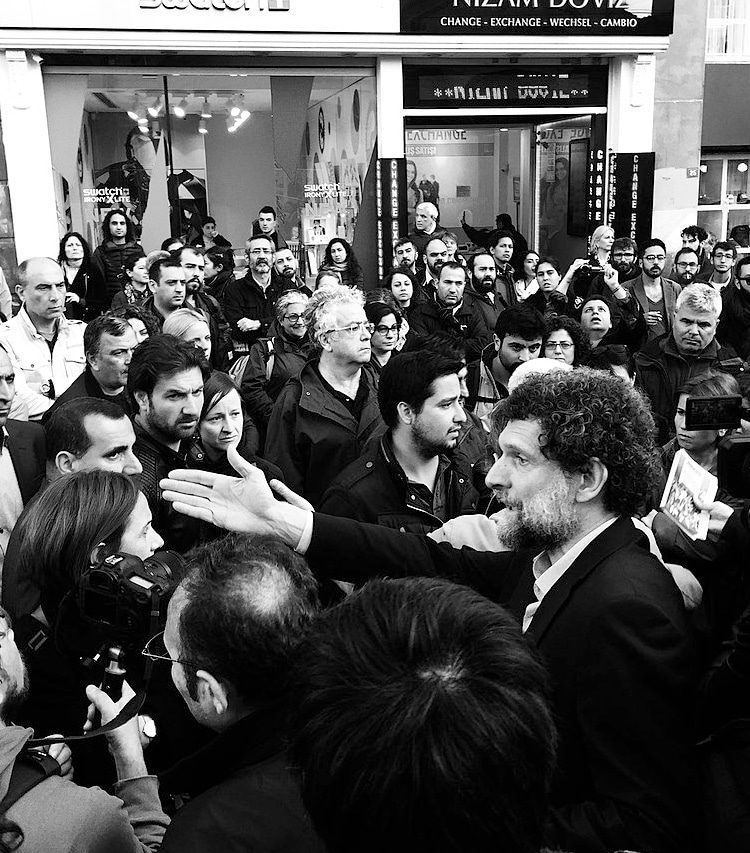
In recent years, Turkey’s human rights record has faced growing scrutiny as a national purge of Gulenists, purported followers of US-based religious scholar Fetullah Gülen, following an attempted coup in 2016 has led to the detention of hundreds of thousands of Turks, even extending to the extraordinary rendition of Gulenists abroad.
But amidst the furore, the detention of one man, Osman Kavala, has particularly captured headlines and garnered international attention.
A wealthy businessman, Kavala is well-known as a philanthropist and civil society leader. As the head of Anadolu Kultur (Anatolia Culture), he was a key bridge between Turkey and the international community, helping to form relationships and build cultural connections.
But while President Recep Tayyip Erdogan’s purge has swelled to constitute a broader crackdown on opposition figures, why has Kavala fallen into this net and why is he so important?
Educated at Istanbul’s American-style Robert College (a stomping ground for many of Turkey’s liberal elite) and having attended university in the United Kingdom (UK), Kavala took over the running of his family’s business group after the death of his father. While it was the financial backing of his business empire that underpinned much of his charitable work, it was his philanthropic endeavours themselves that made his name. Through a number of organisations, including Anadolu Kultur, he garnered an international reputation for his work to try and heal the increasingly fractured landscape of Turkish society.
He was arrested on charges of supporting four “terrorist groups” and for seeking the overthrow of the Turkish constitutional law and order, although at the time, his detention was made confidential and shrouded in uncertainties. However, a year after his initial detention, he still has not been officially charged. The 61-year old has been held in solitary confinement with no sign of a formal indictment or even a prosecutor’s deposition. But that hasn’t stopped Turkey’s leadership from making their view on his innocence very clear.
Less than a week after he was detained, and before being officially charged, President Erdogan publicly accused Kavala of criminal behaviour, labelling him as the “Red Soros of Turkey” and linking him to the 2013 Gezi Park protests.
Furthering these seemingly baseless claims, President Erdogan has also accused Hungarian billionaire (and frequent target for global anti-Semitic conspiracy theories) George Soros of being behind Kavala’s supposedly illegal activities. Attacks like these contributed to Soros ending his organisation’s work in Turkey (Kavala does sit on the advisory board of Soros’ Open Society Foundation, an organisation that supports non-violent civil disturbance, like the Gezi Protest).
A bizarre international twist to Kavala’s detention has been his links to the supposed “mastermind” of the 2016 attempted coup, Henry Barkey, a US university professor who was holding a conference in Istanbul on the night of the attempted putsch. One of the two charges against Kavala is for his contact with Barkey. While Kavala didn’t attend the conference, Barkey has confirmed that the two men did talk briefly at an Istanbul restaurant. Circumstantial though it may seem, this evidence has been sufficient for Ankara to deem Kavala worthy of lengthy detention while the judicial inquiry continues.
However, Kavala’s arrest and the detention of a number of other figures supposedly involved in orchestrating the Gezi Park protests – probably the largest public challenge to Erdogan’s now nearly 17-year rule – does raise alarming questions. Why would the government decide now to revive a five-year-old investigation, especially one around such a tension-inflaming topic?
There is no obvious answer, but while challenges to the dominance of President Erdogan’s AK Party (AKP) persist, he can count on his followers to rally to his defence. Although he faces no electoral challenge anytime soon, having just won a massively empowering presidential race, this fear amongst AKP supporters must surely embolden Erdogan in his continuing campaign to root out Turkish opponents within and outside Turkey.
However, by inflaming tensions and sustaining the flames of suspicion in Turkey, Erdogan can guarantee the steadfast support of his socially conservative, Sunni Muslim base. The political division of Turkey works in President Erdogan’s favour, as long as he can maintain the loyalty of his supporters. Fear of the proverbial fifth-column in Turkish society is a powerful tool to do this.
To that end, since Anadolu Kultur has worked relatively widely with Turkey’s Armenians and Kurds, Kavala’s detention could be read as a form of intimidation against the country’s minorities. It certainly is likely to make Turkic organisations working around minority rights a lot warier about their work.
The eclectic mix of charges that Kavala has been accused of in the Turkish press, from collaboration with Gulenists to spying for the West, to organizing the Gezi protests and links to organized crime, speaks more of the (now almost exclusively state-aligned) media’s efforts to demonize him than of any great body of evidence against him.
Kavala’s status and connection with the international community has no doubt underpinned the press coverage his continued detention is receiving. But this attention has also been translated into political action: the European Union (EU) commissioner for aspirant members’ accession (Turkey has been an official EU candidate since the 1980s) all but referenced Kavala by name in November 2018 as he attacked Turkey’s detention of journalists and civil society members.
Kavala’s continued detention perhaps signals President Erdogan’s fear of well-connected civil society figures with money to spend. Turkey still remains precipitously divided, as the last general election made all too clear and, during a period when Turkey’s economy is struggling and unable to sustain the continued growth of the AKP era, dissent of any kind is potentially dangerous. Although Kavala’s cause of greater ethnic tolerance is often a touchy one in Turkey, today’s tensions aren’t principally rooted in these issues. Kavala’s threat surely comes from his refusal to toe President Erdogan’s line and the potential of his wealth to turn a spark of dissent into a tide of change.


